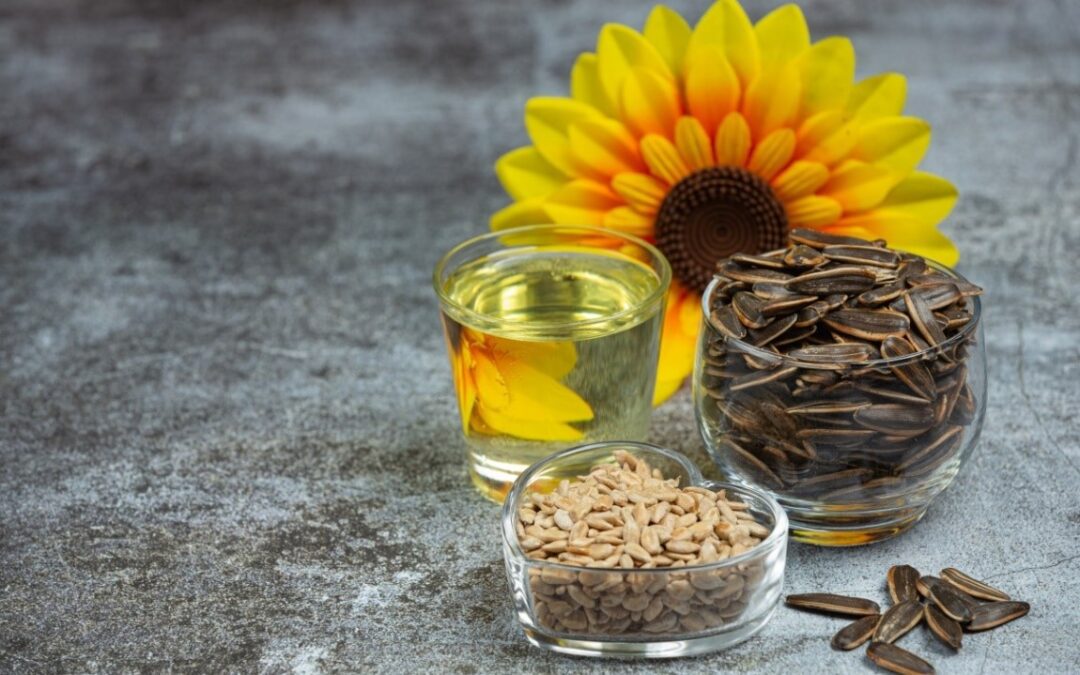Sunflower seeds
(Botanical name: Helianthus annuus)
Introduction
Sunflower seeds are popular health foods that people commonly consume in trail mix, breakfast cereals, or straight from the bag as a snack. They contain beneficial nutrients, including healthy fats, minerals, and antioxidant compounds. Sunflower seeds are harvested from the flower head of the sunflower plant. Sunflower seeds are white and have a sensitive touch, despite the fact that the seed is covered in a shell with black and white stripes. The seeds can be consumed raw, roasted, or combined with other foods and are known for their distinct nutty flavour and great nutritional value.
Nutritional Content:
According to the USDA, the main nutrients in 1 ounce (30 grams or 1/4 cup) of shelled, dry-roasted sunflower seeds contain:
- Calories: 163
- Total fat, which includes: 14 grams
- Protein: 5.5 grams
- Fiber: 3 grams
- Vitamin E: 37% of the RDI
- Niacin:10% of the RDI
- Vitamin B6: 11% of the RDI
- Folate: 17% of the RDI
- Carbs: 6.5 grams
- Pantothenic acid: 20% of the RDI
- Iron: 6% of the RDI
- Magnesium: 9% of the RDI
- Zinc: 10% of the RDI
- Copper: 26% of the RDI
- Manganese: 30% of the RDI
- Selenium: 32% of the RDI
Benefits:
- Lower blood pressure
- Lower cholesterol
- Reduces blood sugar
- Lessen the risk of type 2 diabetes
- Make your skin healthy
- Anti-Inflammatory
- Antifungal
- Antibacterial
- Wound Healing
- Helpful in treating various heart disease like atherosclerosis, hypertension
Risks:
While sunflower seeds are healthy, they have several potential downsides:
- Sometimes sunflower seeds are contaminated with bacteria which multiply when a person grows or buys sprouted sunflower seeds. Sprouted seeds have been responsible for outbreaks of salmonella, which causes symptoms of food poisoning.
- Eating a large number of sunflower seeds at once OR accidental eating of seed shells cause stool blockages (fecal impaction ) in both children and adults
- Some people may also be allergic to the seeds. Reactions may include asthma, mouth swelling, itching of the mouth, hay fever, skin rashes, lesions, vomiting.
- Sunflower seeds contain traces of cadmium. Eating too many seeds can be harmful to our kidneys.
How to Eat?
- Sunflower seeds should not be consumed more than one small cup (around 30 grams) per day
Sunflower seeds (Shelled or shelled kernels) are commonly eaten by cracking them with your teeth, then spitting out the shell. Here are various ways you can eat them:
- Add to trail mix.
- Stir into homemade granola bars.
- Sprinkle on a leafy green salad.
- Stir into hot or cold cereal.
- Sprinkle over fruit or yogurt parfaits.
- Add to stir-fries.
- Stir into tuna or chicken salad.
- Sprinkle over sautéed vegetables.
- Add to veggie burgers.
- Use in place of pine nuts in pesto.
- Grind the seeds and use as a coating for fish.
- Add to baked goods, such as breads and muffins.
- Dip an apple or banana in sunflower seed butter.
- Use sunflower butter in place of peanut butter
- Cook with sunflower oil instead of other oils
Precautions:
While taking sunflower seeds, one should keep these things in mind:
- Due to their high calories, people aiming at maintaining a moderate weight may wish to limit their sunflower seed portions in daily routine.
- Besides being constipated, you may leak liquid stool around the blockage and have abdominal pain and nausea, among other symptoms
Frequently Asked Questions!
Q1. Sunflower seed vs sunflower oil, which is better?
Ans: Sunflower oil has more quantity of vitamin E than sunflower seeds, whereas, sunflower seeds contain vitamin B6, iron, phosphorus and pantothenic acid. Additionally, sunflower seed is more expensive than sunflower oil. Thus, both have their pros and cons.
Q2. How to incorporate sunflower seeds into our daily diet?
Ans: Adding sunflower seeds to one’s diet is really easy like any other seed. You can sprinkle on top of your salad, add to oatmeal or muesli or granola, combine into trail mix, add as one of the ingredients of energy balls for weight loss, add to burgers, stir fry vegetables or even make sunflower butter of it similar to peanut butter.
Q3. How to store sunflower seeds correctly without spoiling them?
Ans: you can store sunflower seeds in an airtight container when kept in an environment that is cool and dry such as a refrigerator and freezer for up to 12 months.
References
- Keller, S. E., et al. (2018). Survival of salmonella during production of partially sprouted pumpkin, sunflower, and chia seeds dried for direct consumption.
- Adeleke, B. S., et al. (2020). Oilseed crop sunflower (Helianthus annuus) as a source of food: Nutritional and health benefits.
- Nandha, R., et al. (2014). Therapeutic potential of sunflower seeds: An overview
- Guo, S., et al. (2017). A review of phytochemistry, metabolite changes, and medicinal uses of the common sunflower seed and sprouts (Helianthus annuus L.).
Want to Know More?
Contact Our Expert Healthcare Professionals for further Understanding of your Disease!

